(10 minute read)
INTRODUCTION
Our latest interview takes us north of the border to one of the largest blues festivals in North America – RBC Ottawa Bluesfest. We figured that anytime you're throwing a 10 day event with 300,000 attendees, 3500 volunteers and 10,000 credentials, there must be a lot to learn from the people behind it all. (Disclaimer: they are a partner of ours, so we're a little biased.)
Lucky for us, we had the opportunity to sit down with the Director of Operations, Mike Rouleau, and Operations Manager, Nick Descarie, to talk about everything that goes into putting on Ottawa Bluesfest from start to finish.
They shared insights about:
- What their timeline looks like 3/6/9 months out.
- The importance of their annual retreat to kick off the planning process.
- How they create an environment where their volunteers keep coming back year after year.
- How technology affects every part of the festival.
- How they are continuing their education programs with a virtual offering.
- And more…
Enjoy.
.jpeg?noresize&width=4032&name=Group%20Shot%20(1).jpeg)
The Ottawa Bluesfest Team - Mike is first on the left and Nick is third from left.
Let's dive in. Where did both of you grow up?
Mike: I'm born and raised in Ottawa, on the east end of the city. I live even more east now.
Nick: Pretty much the same for me. I was born in Toronto, but I grew up in the east end of Ottawa as well.
Big family or small family?
Mike: I have one younger brother, but overall a very small family here in the city. Many of my relatives are not in Ottawa.
Nick: My family is pretty big. I have two older sisters, they're both school teachers. Both sides of my family are in the Ottawa area.
How did you get started working in events?
Mike: I went to school and studied marketing and commerce. After I was done with school, I needed a job and the Bluesfest had a small contract available. I took it just to get through the year. I loved the job and it was cool to be part of the Bluesfest. The contract got expanded and I was offered a full-time position after my second festival. I’m still in that role now.
Nick: My background is similar to Mike’s. I also studied business and specialized in marketing. My professional background combines performing music professionally and construction. Like Mike, I got a small contract with the festival. My experience was a good match for festival planning.
Sounds like most of the Bluesfest team has stuck around for a while.
Mike: The event is 24 years old. The executive director has been with the event since the beginning and our longest staff member has been here for 20 years. We have a lot of people who have been with the event for 5 years or more.
What is your current role and what responsibilities come with that?
Mike: Nick and I are both on the operations team. We’re responsible for everything that our patrons experience. That’s everything from transportation to food vendors. We make sure the patrons have a great experience and a great time.
Nick: Mike is being a little modest. Mike is the Director of Operations and I’m the Operations Manager. In addition to the responsibilities Mike mentioned, we also oversee production and site managers.
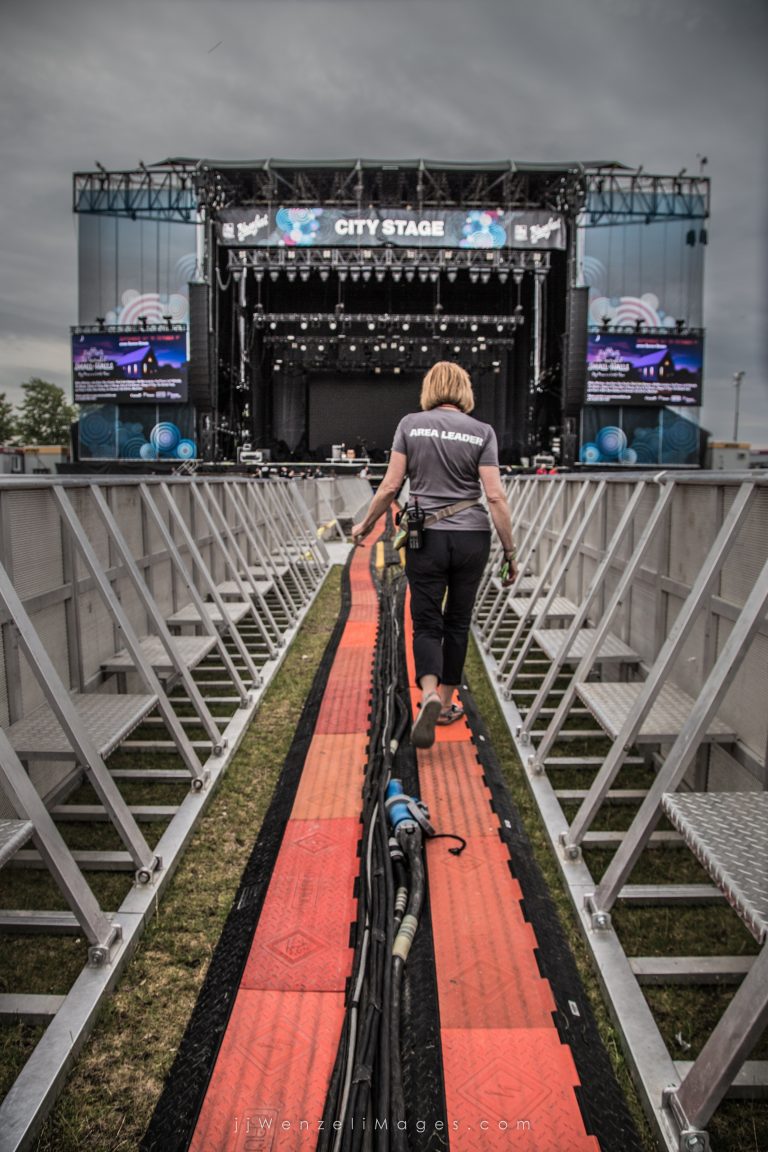
Photo courtesy of Ottawa Bluesfest - JJ Wenzel
Let’s dive into your timeline for putting on Bluesfest. What are your top priorities 6-9 months out from the event?
Mike: Our organization puts on three major events. Our flagship event is in July and that’s the Ottawa Bluesfest. After Bluesfest, the focus shifts to the sister festival City Folk which is in September and then we focus on the Festival of Small Halls in October. After City Folk, some people shift their focus to Small Halls and the rest of us start closing out the year and making sure everything is paid.
We start the planning for Bluesfest at the beginning of the new year. Nick and I have a map on the wall in our office with a running list of notes and changes. Planning is constant and year round. If you’re not making change or improving the patron experience, then you get complacent and you can get in trouble with that.
So it's safe to say planning for the next year starts with taking detailed notes and gathering your feedback while you're on site for the current year?
Mike: Yeah. Definitely. Our planning stage is October through January. That’s when we try and flesh out bigger ideas. That gives us February to July to execute those ideas.
Nick: The staff has a post-mortem retreat in October or November. It’s about three days and we discuss new ideas, problems, and the high level vision. The executive director and board members present their initiatives and we start thinking about how to approach them with brainstorming sessions.
Are you doing anything during this time frame that pays off later on?
Nick: Our approach is to get as much done with as much lead time as possible. We try to knock everything out as far in advance of the actual festival, and then that just gives us more time to execute the things that are actually happening on site.
Mike: We’re getting better about collecting information from our suppliers and volunteer managers. We need them to make us aware of problems so we can fix them. Hearing about a problem in June from last year’s festival doesn’t help anyone. We’re taking stock of the issues by having meetings with all the leaders and board members. Our retreat is important because we discuss items related to the festival and to the organization as a whole. Our organization is a non-profit charitable organization with a branch dedicated to music education. We have to make sure that the organizational vision is aligning with the festival vision.
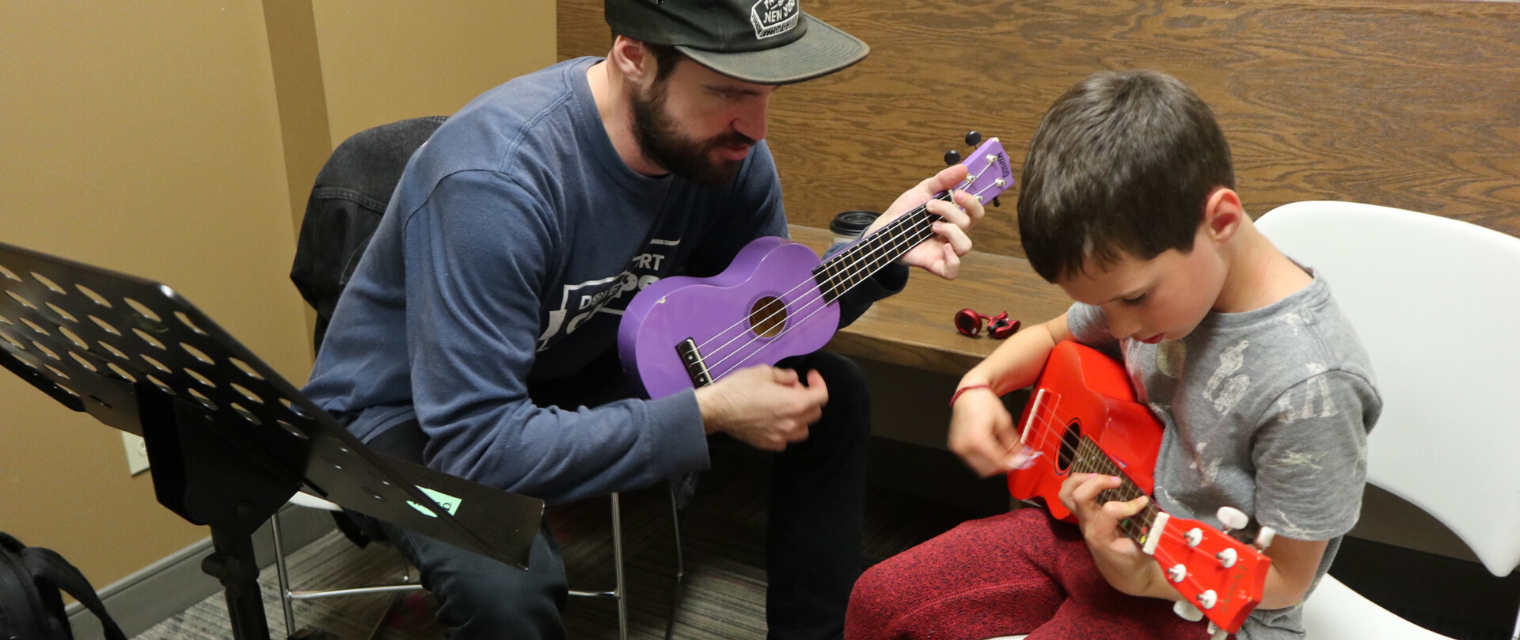
Photo Courtesy of Ottawa Bluesfest
Yeah, that makes a lot of sense. Let’s move further down the timeline. What are you focused on 3 months out from the show?
Mike: Hopefully, we have the majority of the elements confirmed. We’re working with the different departments to put the site plan together. We used to subcontract the auto-cad drawing but now Nick does them. He was able to learn a new skill and it’s given our team a lot more flexibility.
We used to manage our data on spreadsheets. We would start with the first version and end up with version 27 by the end of it. The event has grown and the data started getting unmanageable. Lennd has been a great tool for us. It’s easier for us to compile and track the data in one central database. Then we can share and distribute the data.
What are some of the benefits of bringing your CAD drawings in house?
Nick: It helps us come up with more scenarios in a timely manner and make decisions faster. When it was outsourced, it took too long to come up with a concept and then get the product back. If we come up with an idea, I can jump on the software and have a rendering that afternoon.
Mike: I totally echo that. We’re not the final decision makers. We still have to get input from our executive director and production manager. We’re able to get feedback and approval faster and it has made the overall process more efficient. It has also given us room to be creative. We’re able to explore ideas and possibilities that we didn’t have when we were waiting a week for changes to be made.
You use Lennd to track a broad catalog of assets and equipment. What’s your process of distributing those items and deciding who gets what?
Mike: Each team is responsible for distributing items they will need on-site. For example, our team is responsible for radios, accreditation, and golf carts. One team is responsible for site setup and needs items like tenting, trailers, flooring, and scaffolding structures. There’s another team that distributes beverages. We gather all the requests in advance, plan out the budgets, approve requests, make the purchases, and then the items get distributed on-site to the different teams.
The items start arriving two weeks before the event and the lead up teams take the infrastructure items. We have a large volunteer workforce and they come in closer to the day of the event. They take care of the smaller detail items. We’re lucky to have volunteers who keep coming back year after year. Our volunteer leader for the inventory area has been with us for a decade. She knows the festival inside and out. Since we don’t change the site layout very much, she knows exactly where everything is, who is responsible for it, and where to take it.
Nick: I want to add to Mike’s last point. Organization knowledge is huge. Our job is to oversee everything and be organized but we also just know things. We can make decisions quickly because of that knowledge. When we first approach the site layout, we make sure that the site is safe and comfortable for everybody and then we think about how we sell stuff. Beverage sales is a huge income stream. We don’t want people waiting in line for two hours for a beer. That dictates the amount we need to distribute around the site. Once we have the food and beverage locations set up, we can set up other areas and distribute the assets.
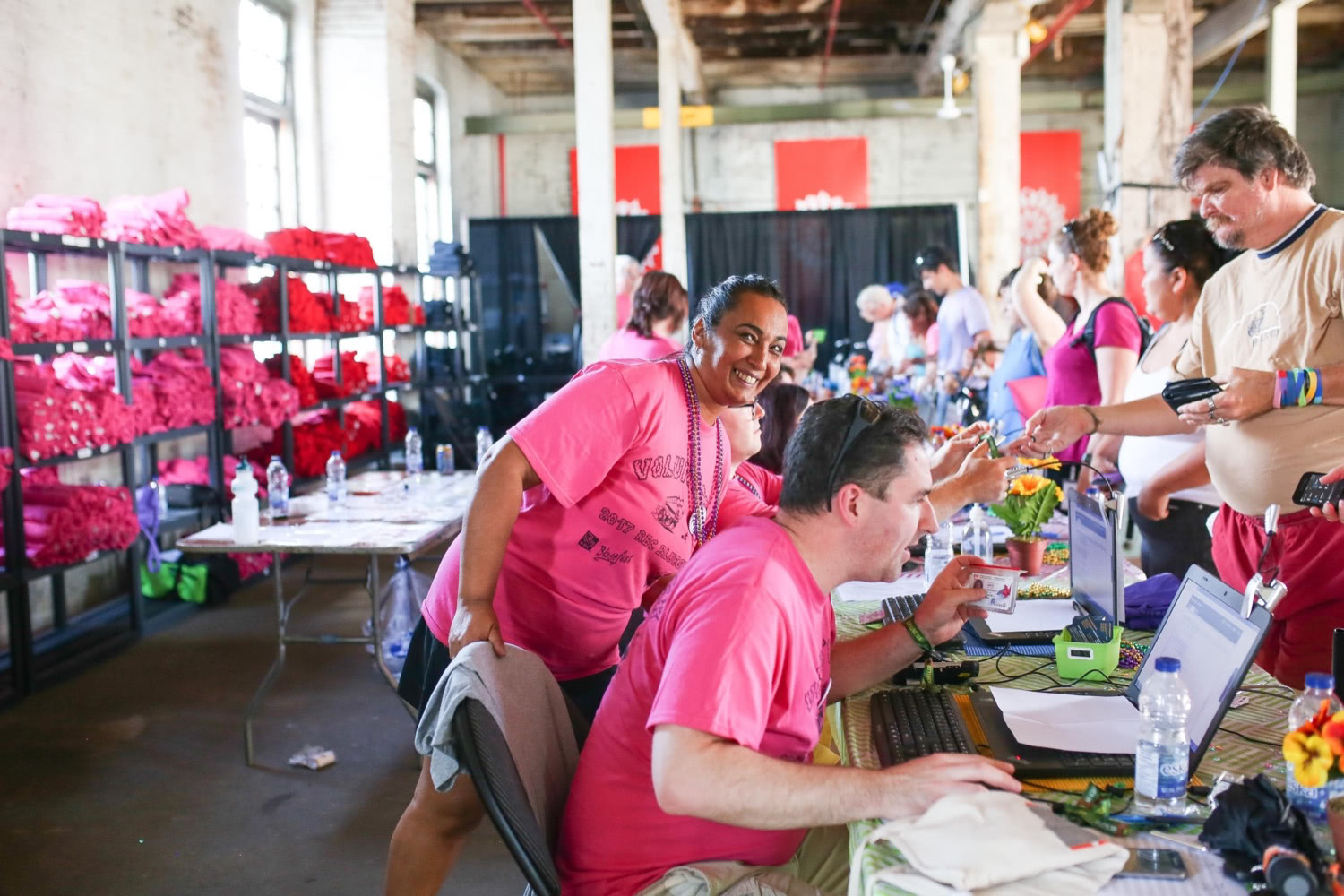
Volunteer Check In - Photo Courtesy of Ottawa Bluesfest
You mentioned that you have a large volunteer workforce. How many volunteers do you have, how do you recruit them, and how do you manage their roles and shifts?
Mike: One of our biggest claims to fame is our volunteer workforce which is about 3500 community volunteers. Our retention rate is between 60-70%. Our volunteer leadership retention rate is 90-100%. We have about 2000 people that are coming back each year which means we’re not actively recruiting 3500 people each year. We also keep two full time volunteer managers on staff.
Recruitment works in various ways. We utilize job fairs and social media posts. There’s also a lot of word of mouth. In Ontario, high school students need 20 hours of community work to graduate which leads to us getting a lot of high school volunteers.
When we first started, volunteers used to fax in their paper registrations and we would schedule their shifts. Now we use software that allows volunteers to self-register and self-schedule. If I’m a volunteer at Bluesfest, I can go in and choose the nights I want to work and the shift times. I can even select what beer tent I want to work at. That has taken a huge amount of work from our volunteer management team.
Nick: I think the reason we have such a high retention rate is it’s basically a summer camp for adults. They get to hang out with their friends, work a little bit, and watch some rock and roll. If you volunteer for 4 hours, that’s the equivalent to a full festival pass. You get access to the event by putting in the time. It gives people that aren’t as financially fortunate to work towards something and enjoy the festival without spending hundreds of dollars. We also feed them, give them free t-shirts and other things.
Mike: We surveyed the volunteers and we know the two reasons they volunteer at Bluesfest is because of the community feel and the free shows. They are able to hang out with their friends and meet new people. We spend a lot of time internally on designing their t-shirts and food menu. The food is a big one. When you go to a party and the food sucks, you think the host didn’t do a good job. We really want our volunteers to also have a good time and listen to music.
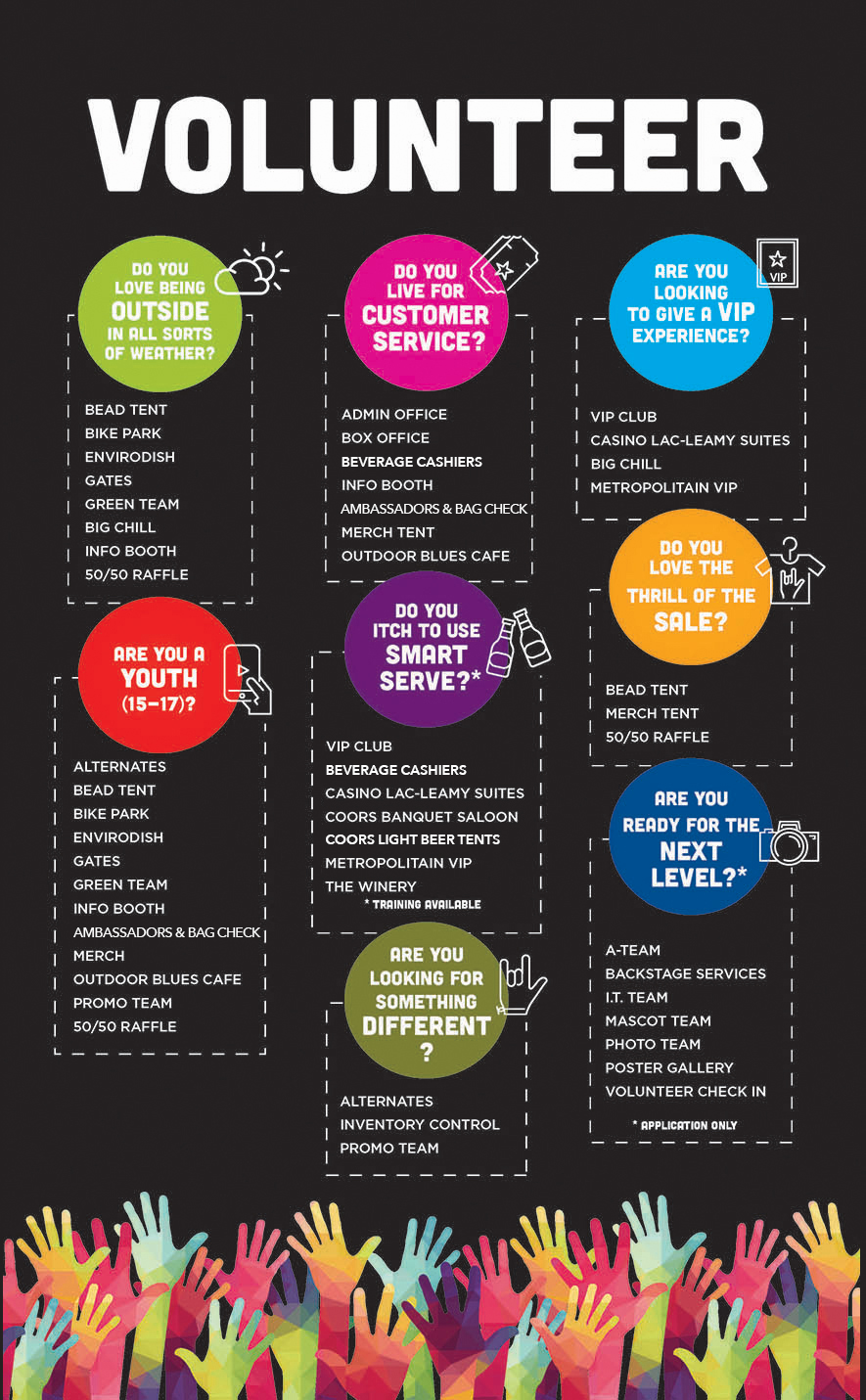
Photo Courtesy of Ottawa Bluesfest
Let’s move on to working on-site. When you do you guys arrive and what are you focused on until the gates open?
Mike: We take possession of the field two weeks before the festival starts. We start with the trailers, the flooring, tents, and building the stage. Everything revolves around those timelines. It would be great if we could have everything ready a week early and do test runs but we don’t want to waste money renting infrastructure for an extra weekend. We’re building up until five o’clock on opening night.
We’ve used most of our suppliers for years and they know that gates open at 5 o’clock on Thursday. Everyone is scheduled to be ready by 4:30PM on Thursday afternoon. We’re lucky. We don’t have to push or handhold. Our job is to oversee. We take a 20,000 foot view of the festival and we only get into the weeds when needed.
How does your job once the gates are open and patrons are in?
Nick: Our job switches from building a miniature city to keeping it running. Mike and I spend the morning and early afternoon fixing problems or making improvements. We have daily tasks and we check in with different areas that affect patrons and volunteers. The hour before gates open is about the patron experience. We make sure the beverage systems are working, the queues aren’t too long, and the gates are flowing properly. Our job is to make sure everything is running efficiently and make minor adjustments to make the experience better.
Mike: Once the gates are open, Nick stays on the front of lines to make sure the patrons are having a great experience and my focus shifts to emergency management. Overall, it’s about the patron experience.
Most festivals are 1-3 days. Your event is 10 days. Do you have any unique challenges resetting for a show every day?
Mike: The big thing is we don’t make any changes if we can avoid it. We don’t tear down and set up tents, trailers, or stages everyday. If you have a festival passport, you’re coming to the same event with different musicians every night. Our data tells us that passport holders come between six to seven times out of the 10 days. They’re ok with the same look and feel, the same gate experience, and the same beer menu. We might change things up a little for the VIP customers but the general ticket holders love experiencing 10 nights of music in Ottawa in the summer. From an employee perspective, it’s a marathon and not a sprint. We understand that it’s long and we’ll switch off coming in early and staying late. You have to take care of yourself first. You can’t go hard on night one and you have nothing left for nine more nights. You’re not doing anybody any favors if you burn out after the first day. Find your rhythm and if you need time, take time.
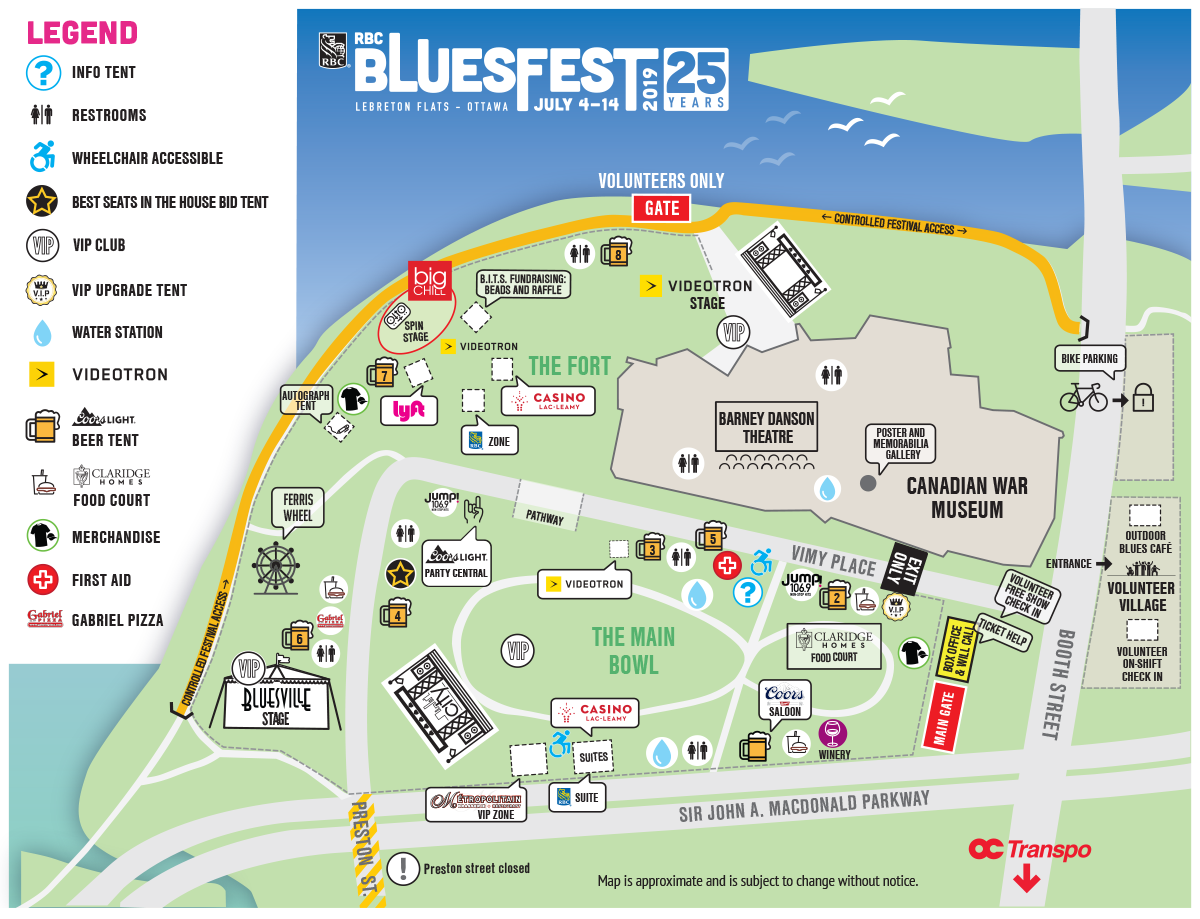
Image courtesy of the Ottawa Bluesfest
Let’s move on to load out. What does your load out process look like and what are you doing to make it efficient?
Mike: We have five days to load out our event. We don’t have any permanent infrastructure on our site. Everything has to go and we have to return the park to its original condition. It’s an organized order. The tent has to be moved before the floor can be moved. You don’t want a bunch of contractors waiting around. The last few days of the festival, we make contact with the contractors and remind them when they need to get their stuff out. You should be figuring this out when you’re making agreements and signing contracts. You should be talking about the load in and the load out process. If you think something should be moved on Wednesday and they think it’s being moved on Sunday, you have a problem. You're the problem because you didn’t communicate and organize the plan properly.
Nick and I divide the duties. Nick takes the field load out and I focus on getting everything back to the office. I’m also focused on administrative duties such as invoicing.
Nick: A good analogy is soundchecks on stage. If you’re the headliner, you’re first to do your sound check and you’re the last to perform and leave. It’s the same for contractors. If you’re first in as a contractor, you’re probably going to be the last one out.
I also assume you’re taking notes and collecting feedback to review at your retreat, right?
Mike: Yes, I would be disappointed in us if we didn’t have notes or thoughts on the year. No matter how well a year goes, we can evaluate. As soon as Bluesfest is over, we start focusing on CityFolk. We don’t have time to reflect until after CityFolk. That’s why notes are key. If we’re not talking about Bluesfest until October, that gives us over two months to forget things. We also take a lot of pictures. We send drones up to take wide angle shots. We also have ground level shots. We try to capture as much information as possible so we have plenty of references when planning for the next year.
You mentioned drones, how else does technology help you do your job?
Mike: It’s an interesting time to be talking about technology. We’re all working from home, trying to stay connected and be efficient. Everything we do touches technology. We use it for ticket sales, RFID access control, volunteer management, volunteer registration, operations, and site planning. It’s really important that any technology we use is easy to adopt because it can be a challenge to get people on board and adopt new tools. If you don’t have buy-in, it’s not going to work.
We’ve used four different POS providers over the last four years and we finally found one that worked. It took trial and error. We were struggling with American POS systems because the debit interaction and integration is different in Canada. We finally found a Canadian supplier and an international supplier and it’s helping us go where the world is going, which is cashless. We’re working on an integrated app that will speed up purchases of beverages which allows us to provide a better patron experience. It helps to start small and then grow as you adopt and use the tools.
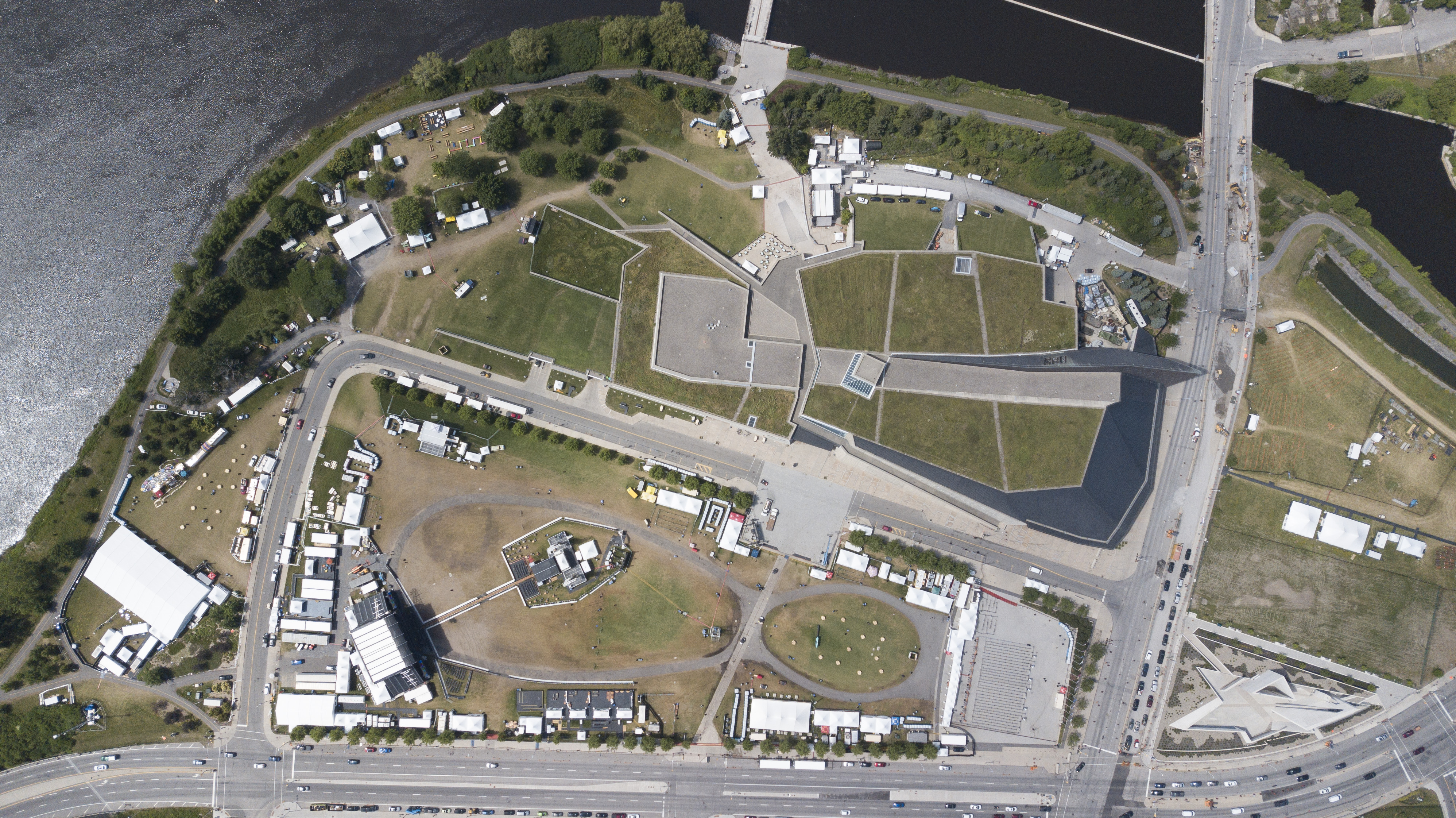
Aerial view from the drone
What types of reports or data are you using to do your job? Do you have any dream reports?
Nick: We look at several reports on a daily basis. Some of our main reports encompass ticketing, beverage sales and weather. We use a third party weather company that provides daily reports and live information. The daily reports are also shared with our executive director.
Mike: Reporting is paramount on a daily basis. If we’re looking at sales reports, we can see that maybe one of the bars isn’t selling properly. It gives you an opportunity to look and adjust. One of the positives of being a 10-day event is that we have more of an opportunity to make changes and recover. There is all kinds of information out there. You have to know where to look, how to get it, and what to do with it once you have it. A report is only as good as what you do with the information.
What are you looking for when you hire people for your teams?
Mike: First and foremost, you have to be competent and we have to feel you can do the job without taking up too much of our time. We also want to enjoy working with you. Personal dynamics are really important. It’s a 10-day event and you’re stuck in small spaces. You have to like the people you are working with.
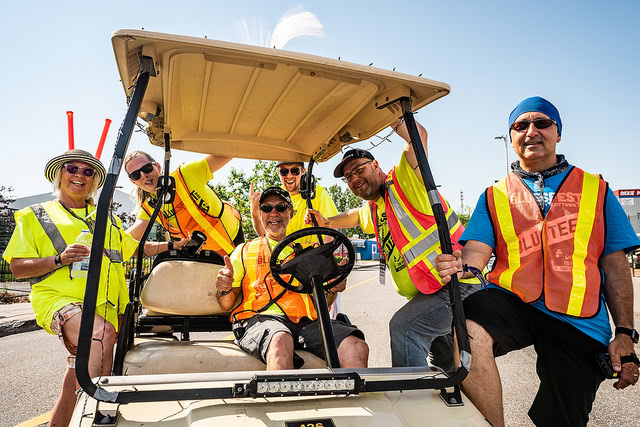
Photo Courtesy of Ottawa Bluesfest
Every event producer has a crazy experience. What’s yours?
Mike: One night we had a fire truck show up during the Kiss show. All of a sudden a ladder goes up and we don’t have fire on site. We’re all questioning why the fire department is there. If a fire truck shows up, it’s because there is a fire. Some of the guys start climbing the ladder to get over the tree line and they are just watching the show. I always remember the truck showing up without lights, the ladder goes up, and the firemen climb the ladder just to watch the show for free.
Nick: My first year working at the festival, I was walking to go do something and I saw a yellow bus inside the festival perimeter. I waved the bus driver down and asked what was going on and how they got in. They somehow got past our security and volunteers at the gate without showing they had tickets. The bus was full with 25 women celebrating a bachelorette party. They traveled from New York State up to Ottawa and never stopped to go to the bathroom. All the women rush off the bus to use the facilities. I’m running around trying to keep track of them and get them back on the bus and get the bus outside the gate. It was just a weird experience trying to get all these women who did not want to cooperate back on to their yellow bus.
Where does your brand: We Do Good Things, come into play in all of this?
Well, Ottawa Bluesfest and CityFolk are registered charities... so we run music education programs called Blues in the Schools, Be In The Band and What's in the Song. We also have a number of Greening initiatives, local artist workshops, etc.
With all of these, It was getting confusing from a marketing perspective, so we decided to try and combine the marketing of all the things we do in the community into one banner... and that is where "WE DO GOOD THINGS" comes from.... it isn't a program, it isn't a class, it is a branding tag line. All the community related things are within the website.
Currently, we have tried to move as much as we can virtual. We have a few community centers running programs virtually and the test cases are going really well so far.
Here is an example of one of our virtual offerings.
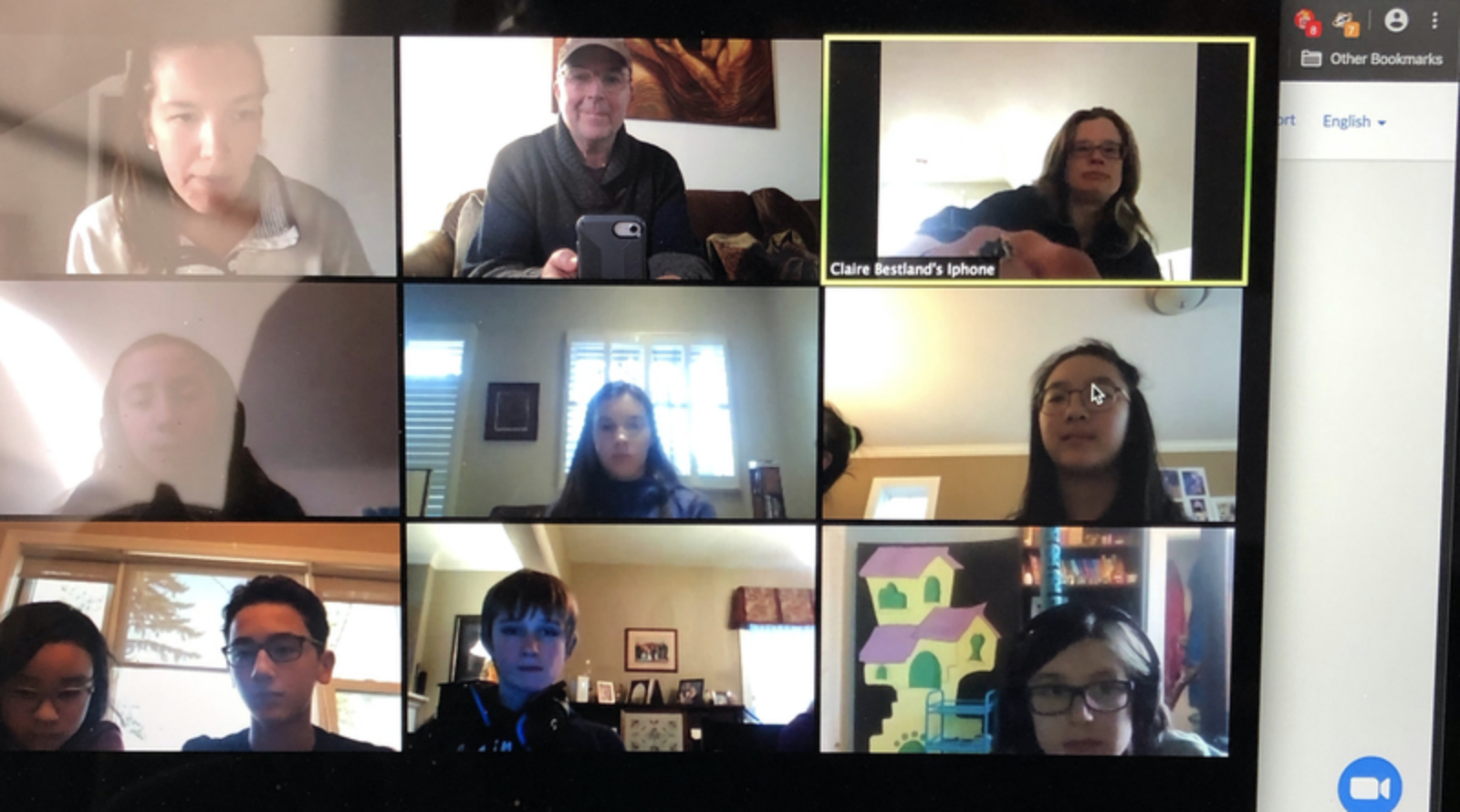
Last question, if you could interview anyone in the industry, who would it be and what would you ask them?
Mike: I love sports and I would like to dive into what goes into the events and production of college football games with 100,000 people in the stadium and the thousands of people in the tailgating area. It would be cool to learn more about the sports world.
Nick: I would love to be a fly on the wall for a production of the major Cirque Du Soleil shows. I find the coordination, harmony, cadence, and perfect execution of those shows to be really impressive. They’ve got people risking their lives on cables. It would be pretty interesting to learn about that.
------
LENND, INC
Lennd is a next generation event management platform that simplifies operations and logistics so event teams can work smarter, move faster, and improve their ROI.
To learn why some of the most respected event teams trust Lennd to power their operations or sign up for a demo: www.lennd.com
RBC BLUESFEST
RBC Bluesfest is ranked as one of the Top 10 Outdoor Music Festivals in the WORLD! A 10-day music extravaganza in the heart of Canada's Capital. www.ottawabluesfest.ca
nada's



